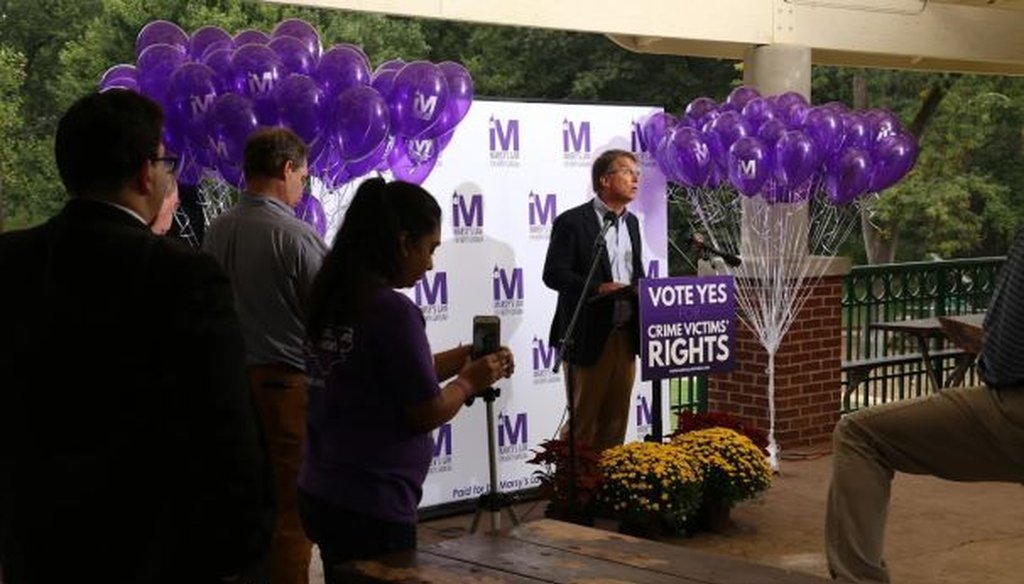Stand up for the facts!
Our only agenda is to publish the truth so you can be an informed participant in democracy.
We need your help.
I would like to contribute

Former Gov. Pat McCrory speaks in favor of the proposed Constitutional Amendment related to victims’ rights during a rally in Latta Park in Charlotte on Sept. 10, 2018. The amendment is also known as Marsy’s Law.
Voters in North Carolina are being asked to support or oppose six changes to the state constitution.
All the proposed constitutional amendments were put on the ballot by the Republican-led legislature. The Republican Party is asking voters to approve all six, and the Democratic Party is asking voters to vote against all six.
Legislators had to rewrite two of the six amendments earlier this year after a panel of judges found the language they originally approved to go on the ballot would have misled voters. They have since made enough changes to satisfy those judges. Meanwhile politicians on both sides of the aisle have made claims about those amendments. Some were true. Some were not.
But first, for those unfamiliar with the amendments, in short they would:
▪ Reaffirm the right to hunt and fish
Sign up for PolitiFact texts
▪ Create new rights for victims of crimes
▪ Cap the state’s maximum possible income tax rate at 7 percent
▪ Re-establish voter ID laws
▪ Limit the governor’s power to appoint judges to vacant seats, and transfer most of that power to the legislature
▪ Give the legislature the governor’s power to appoint members of the N.C. Board of Elections and Ethics Enforcement, and cut the board from nine to eight members.
Here are PolitiFact NC’s fact-checks of claims about the amendments.
How unpopular are they?
In September, a liberal group called Stop Deceptive Amendments bought a TV ad that suggested voting against the amendments, saying that "Every former chief justice and every former governor — Democrats and Republicans — all recommend voting no."
PolitiFact rated the claim False.
It’s true that all five former governors oppose the two amendments that would transfer power away from the executive branch and to the legislative branch regarding judicial appointments and the elections and ethics board.
"It’s not about partisan politics, it’s about power politics," said former Gov. Jim Martin, a Republican who served from 1985-93. "And it must be stopped."
But the ad was false because it implied the former leaders opposed all six proposed amendments. In fact, the five governors went back into their partisan camps when it came to the other four amendments. The three Democrats are opposed, but the two Republicans support them.
After PolitiFact began asking questions about the ad, the group behind it recorded a new, more accurate version.
Victims’ rights and abortion
One amendment, colloquially called Marsy’s Law, would expand the rights people have after they become victims of crimes.
A widely-shared blog post on BlueNC urged people to vote against Marsy’s Law, saying it "will pave the way for making abortion illegal under North Carolina’s constitution."
PolitiFact rated that Pants On Fire.
The amendment would only create new constitutional rights for victims of crimes. And since it’s not a crime to get an abortion in North Carolina, except in certain circumstances, the amendment could not be applied to aborted fetuses. Furthermore, the U.S. Supreme Court has ruled that abortion is a constitutional right, and states cannot do anything that violates U.S. constitutional law.
Outside of the baseless claims about abortion, Marsy’s Law has drawn other critiques. It is the rare piece of criminal justice reform that has raised concerns among district attorneys and criminal defense attorneys alike.
Other states that have passed the amendment have experienced large spending increases and new layers of bureaucracy that have slowed down the justice system. According to a nationwide look at states that have passed it, written by the criminal justice-focused Marshall Project earlier this year, "Marsy’s Law is expensive and almost impossible to follow to the letter."
However, supporters say the North Carolina version of Marsy’s Law was tweaked to address some of the problems other states have faced — and that anyway it’s needed to further protect crime victims in North Carolina, on top of the existing state constitutional protections that voters passed in 1996.
According to previous reporting by The News & Observer, different state agencies have estimated Marsy’s Law would cost North Carolina anywhere from $11 million to $30.5 million a year.
Regardless of the reasons to support or oppose it, no one should take any stance on the amendment — pro or con — based on rumors about what it might do to abortion laws. It will not change whether abortion remains legal here.
Power to pick judges
Republican legislative leader Tim Moore, the N.C. speaker of the House, defended the amendment to limit the governor’s power to appoint judges and give the legislature most of that power.
He said most states don’t let the governor personally decide who will fill judicial vacancies. PolitiFact rated that Mostly True.
Moore was technically correct. In most states, an outside nonpartisan committee picks finalists, and the governor, legislature or both then pick from the list of finalists. But what Moore didn’t mention is that North Carolina isn’t quite going to use that system, either.
Experts told PolitiFact that the system the North Carolina amendment would put in place does not give nearly as much power to the nominating commission as most states use, and gives more to to the legislature.
The amendment would also give the North Carolina legislature the power to appoint some members of the nominating committee, which is actually just as rare as letting the governor make picks directly.
In both cases, just seven states have those systems.
Voter ID as voter suppression?
Many opponents of voter ID say it will do more harm than good, since voter fraud is almost nonexistent yet many legitimate voters don’t have a photo ID they can use at the polls.
House Speaker Tim Moore said voter ID laws have caused "zero decrease" in voter participation in other states, and, "Most have seen an increase."
PolitiFact rated that Mostly False.
There’s no evidence at all for Moore’s claim that voter ID laws increase turnout.
And the research into whether they have a negative effect on turnout, or simply no effect, is mixed. Experts also agree that, even if voter ID laws don’t affect turnout in general, they do disproportionately affect minorities.
The legislature’s last attempt to create a voter ID law, in 2013, was overturned in federal court as being unconstitutional. The 4th U.S. Circuit Court of Appeals ruled that the law was intentionally discriminatory, and meant to "target African Americans with almost surgical precision."
Why not have ID to vote?
The Republican House majority leader, Rep. John Bell, recently encouraged voters to pass the voter ID amendment.
He called it common sense because you need an ID to get on a plane, see a movie, cash a check or use a credit card.
But as PolitiFact pointed out, none of that is true.
It’s easier to do all of those things with a photo ID, but not necessarily required. Furthermore, three of the four actions on Bell’s list aren’t even governed by laws — just corporate policy.
It should also be noted that none of those things he listed are constitutionally guaranteed rights like the right to vote is.
Pressuring corporations on voter ID
Both Amazon and Apple are in the middle of picking a home for a new headquarters. The Color of Change, a racial justice organization, called on both companies to boycott North Carolina if voters approve the voter ID amendment.
But a conservative think tank in Raleigh, the Civitas Institute, said it would be hypocritical for those companies to do so.
"Apple and Amazon already operate in many states that require levels of voter ID," Civitas wrote.
Nearly three dozen states have voter ID laws and Amazon and Apple both have operations in many of those states, including some of the states with the country’s strictest voter ID laws.
--
This story was produced by the North Carolina Fact-Checking Project, a partnership of McClatchy Carolinas, the Duke University Reporters’ Lab and PolitiFact. The NC Local News Lab Fund and the International Center for Journalists provide support for the project, which shares fact-checks with newsrooms statewide.
Our Sources
PolitiFact NC, Aug. 22, 2018, "Do Amazon, Apple operate in states with voter ID?"
PolitiFact NC, Nov. 1, 2018, "North Carolina voter ID amendment debate features misleading claims"
PolitiFact NC, Sept. 27, 2018, "Ad misleads about NC governors opposing constitutional amendments"
PolitiFact NC, Aug. 29, 2018, "NC Speaker says constitutional amendment puts NC in line with other states"
PolitiFact NC, Aug. 14, 2018, "Could this NC constitutional amendment make abortion illegal?"
PolitiFact NC, June 20, 2018, "States with voter ID laws have seen 'zero decrease' in turnout, NC Republican says"



















































